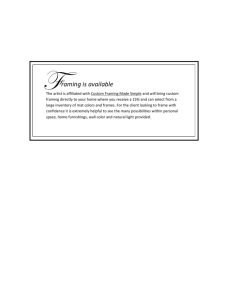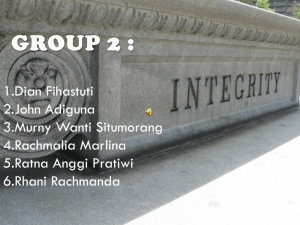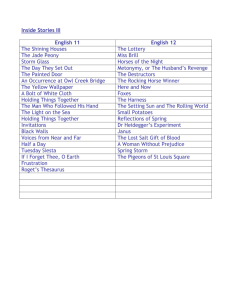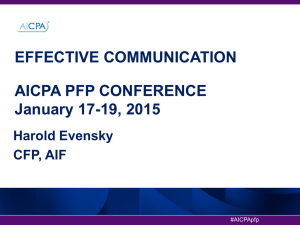Suggestions for improving future writing assignments
advertisement
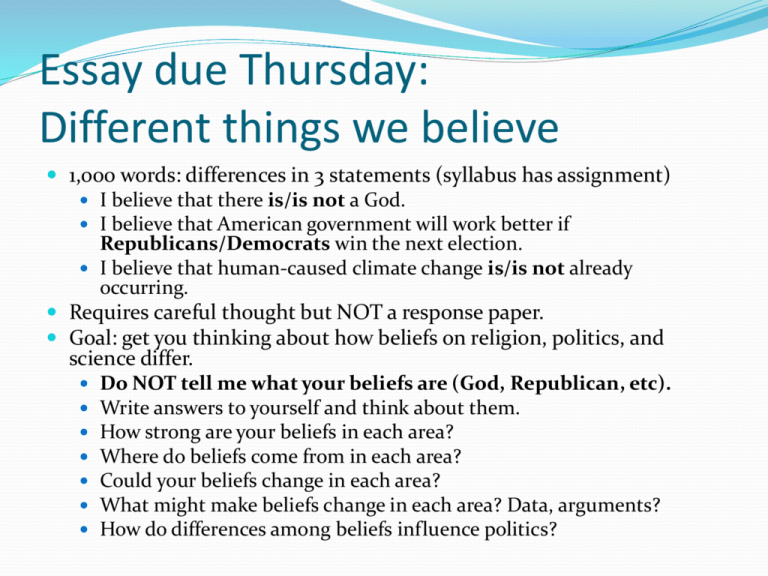
Essay due Thursday: Different things we believe 1,000 words: differences in 3 statements (syllabus has assignment) I believe that there is/is not a God. I believe that American government will work better if Republicans/Democrats win the next election. I believe that human-caused climate change is/is not already occurring. Requires careful thought but NOT a response paper. Goal: get you thinking about how beliefs on religion, politics, and science differ. Do NOT tell me what your beliefs are (God, Republican, etc). Write answers to yourself and think about them. How strong are your beliefs in each area? Where do beliefs come from in each area? Could your beliefs change in each area? What might make beliefs change in each area? Data, arguments? How do differences among beliefs influence politics? Suggestions for improving future writing assignments Ensure you analyze, not just describe Compare things you expect to have the same DV value Compare over time AND across countries Compare using rate and trends more than levels Compare 2 groups rather than 2 countries Use tables and charts for data and analysis, but text for explanation (charts show lots of info in little space) Avoid too much detail and look at big patterns Use headings Professional/scholarly voice: “its wacky…” / “it came to my mind that…” / “In doing this assignment…” Use citations – and cite the readings! Numerous religious calls for action Muslim: “The world is sweet and verdant, and verily Allah has made you stewards in it, and He sees how you acquit yourselves.” Aug 2015: Int’l Islamic Climate Change Symposium Since 2013, many protestant churches have voted to divest of coal, or fossil fuels more generally Evangelical Environmental Network: “Creation-care means caring for all of God’s creation” Interfaith Power & Light (since 2000) Jewish Environmental and Energy Imperative Catholic: Pope’s 2015 Encyclical Australian Religious Response to Climate Change network Why reframing climate change in moral terms might work What is framing and how does one reframe an issue? What is logic of consequences vs. logic of appropriateness? Why logic of consequences won’t work Why logic of appropriateness might work Framing: What do you see? Framing: What do you see? Chivalry or sexism Memes are frames Framing: Is Angelina Jolie a feminist or not? Framing: Is Angelina Jolie a feminist or not? Lara Croft Launched “Preventing Sexual Violence Initiative” Angelina Jolie Pitt What you highlight depends on what you want to argue Framing American Progress or … American Progress, John Gast (1872): “Columbia, a personification of the United States, leads civilization westward with American settlers. She brings light from the East into the darkness of the West” (wikipedia) Framing: American Progress or … Clear Cut http://marlimillerphoto.com/timber.html Successful RE-framings of issues in moral terms Slavery – economic strategy or morally repugnant? Landmines – cheap weapons of war or killers of innocent children? FGM: “Disfiguring, Hurtful, or Wildly Festive”? – New York Times article Reframing involves drawing attention to new facts and perspectives that we otherwise ignore Logic of consequences vs. Logic of appropriateness Logic of consequences: examine alternatives and, after calculation of costs and benefits, decide which has lowest costs and largest benefits for the individual decision-maker Logic of appropriateness: Act as appropriate, with little if any conscious thought – taken for granted what “correct” thing to do is Assess one’s desired identity/role in society and then look at social norms to identify what is the “right” thing to do in that social setting Perfect Moral Storm: Stephen Gardiner Is climate change a moral issue? Yes, can’t discuss it without moral framing Causes of the “perfect storm” Features of the storm Moral corruption that storm induces Causes of the “perfect storm” Definition: “Unusual convergence of independently harmful factors where this convergence is likely to result in substantial, and possibly catastrophic, negative outcomes” Six causes Dispersion of causes and effects: externalities Fragmentation of agency: collective action problem Institutional inadequacy: institutional lock-in Scientific uncertainty Carbon embedded in institutional infrastructure Skewed vulnerabilities Features of the storm Spatial dispersion Temporal dispersion All lead to inaction Moral corruption that storm induces Encourages “manipulative or self-deceptive behavior” Distraction Complacency Unreasonable doubt Selective attention Delusion Pandering False witness Hypocrisy Addressing climate change may not be in our interests (loc won’t work) Individualism: Costs of action fall on individual taking action, benefits to others Future benefits: Costs of action are today, benefits are tomorrow Uncertainty: Costs of action are for sure, benefits are uncertain Collective action: Costs of action depend on own action, benefits depend on actions of others Rich can adapt: Costs of action are unavoidable, costs of INaction are avoidable for the rich Beneficiaries face obstacles to mobilization: Beneficiaries of action lack resources to mobilize How can we reframe climate change? What facts do we highlight? How do you “frame” those facts? What interpretations do you suggest when you talk? Facts that foster successful re-framing Non-religious re-framing: Focus on costs of INaction not costs of action Better strategy: shift terms of debate to logic of appropriateness from logic of consequences Highlight climate injustice, not costs Not “the Earth” but “God’s creation” or “God’s 2nd greatest gift” (Katharine Hayhoe) Focus on obligations to future generations rather than individualism Avoidance of harm as a right, rights are not negotiable

